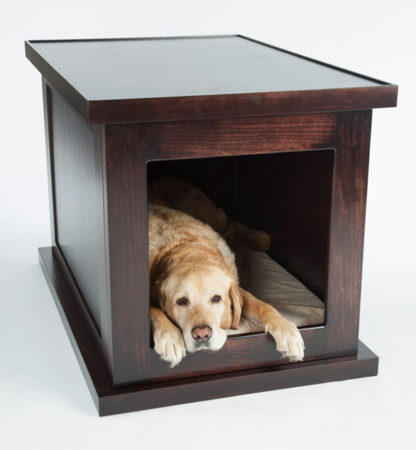Dog Anxiety – Finding Relief for Anxious Dogs
One of the reasons that people relate to dogs is because in many respects, they are so similar to us humans. We are able to form bonds and attachments to dogs, integrating them as more than just pets but truly as members of our families. As they experience the same emotions of happiness, excitement and love, our dogs also experience fear and anxiety. It’s important for dog owners to understand the different types of anxiety in dogs, and to provide dogs with relief and treatment whenever necessary. In addition to medical treatment options, there also are holistic treatment options available. These treatment options for dog anxiety allow your pet to enjoy a comfortable life, and prevents your dog from experiencing debilitating symptoms.
What are the Types of Dog Anxiety?
Various types of dog anxiety have been noted in these animals for years, and according to PetMD, there appears to be a genetic link amongst certain breeds in some cases. The most common types of anxiety in dogs include:
- Separation Anxiety — Separation anxiety in dogs typically begins around the time the dog is socially mature, between 12 months and 36 months old. However, elderly pets also can begin to experience this type of anxiety as their mental and physical health declines. This anxiety stems from the fact that the dog is particularly attached to its owners, according to Web MD Pets, and the dog is unable to cope when the owners are not present. This can be difficult for your pet, as it is not able to explain its symptoms and feelings to you, and many of the mild symptoms appear when you are not at home.
- Noise Sensitivity — Loud, unexpected noises can leave dogs feeling extremely anxious. In particular, fireworks and thunder have a tendency to scare dogs and cause them to show signs of anxiety.
- Aggression — Dogs that experience deeply-rooted anxiety for many months or years may become aggressive. Initially, this aggression may be a defense response from your pet, but it will quickly become an offensive tactic if the dog is able to get what it wants by being aggressive. Aggression is a serious concern, and in many cases it is associated with anxiety. By treating the root cause of the issue, which in many cases is anxiety in dogs, you can often thwart the feelings of aggression and aggressive actions of your pet.
- Generalized Anxiety — This type of anxiety is not as common in dogs, but it happens occasionally in some pets. With this anxiety, your dog will feel extremely uncomfortable in many different situations. It can greatly reduce your pet’s quality of life, and should be addressed with your veterinarian.
- Idiopathic Fear — Idiopathic fear is defined as a serious fear for unknown reasons, often resulting in a withdrawn and elusive dog. It appears to be linked to specific dog breeds, including the Standard Poodle, the Greyhound, the Bernese Mountain Dog, the Border Collie and the Siberian Husky, to name a few.

Treatment for Anxiety in Dogs
Treatment for anxiety in dogs should be personalized based on the breed of your pet, the symptoms it is experiencing, and the severity of the anxiety. How to find relief for your anxious dog should be carefully considered. Work with your veterinarian in order to determine the best treatment option for your dog. Here are a few options to consider:
- Medication — Prescription medications are available for dogs that experience severe anxiety and fear. These medications can be prescribed by your veterinarian, but may result in side effects. You should discuss these with your pet care provider.
- Behavioral Modification and Training — Behavior modification encourages your dog to relax in situations that it finds uncomfortable or scary. It requires a significant commitment on your part, and its effectiveness will vary based on your particular dog.
- ZenCrate — The ZenCrate is a holistic alternative to many anxiety treatment options in dogs. It is the first-ever intelligent crate designed to give dogs a safe space to go when they feel scared, and immediately provides them with comfort. It is ideal for dogs with separation anxiety, and dogs who are afraid of loud noises.
What is ZenCrate?
ZenCrate is a pet-friendly, holistic treatment option for anxiety. It is a specialized crate designed to provide comfort, care, and support when your dog is present. This den is a quiet, comfortable space that includes an orthopedic memory foam bed that allows your pet to relax. It is a place they can retreat to when they feel scared, nervous or anxious at any time — even when you are not around. Unlike anxiety medications or behavioral modification programs, you do not have to be present in order for the ZenCrate to be effective. When you aren’t around and your dog feels nervous, it can simply enter the ZenCrate and relax.
Utilizing the most advanced technology, the ZenCrate’s proximity sensors detect when your dog has entered the den. Instantly, the crate begins to play soothing, calm music that can help ease the nerves of your pet. Its acoustics are designed to drown out the loud noises from the outside, making your pet feel calm and safe. Finally, as the music plays, the vibration-dampening technology reduces the physical vibrations your pet may feel from fireworks, thunder, or noises from loud machinery. The impact is instant, as opposed to medications which may take 30 minutes or longer to take effect.
Find out why ZenCrate is the premier anxiety treatment option for your pet and start helping your little fury buddy today.
Dog Anxiety Symptoms
The signs and symptoms of anxiety in dogs can range from mild to severe, but regardless of the strength of symptoms, it’s important to recognize that your pet probably needs treatment of some form. They cannot understand their feelings of anxiety, nor can they address the issue themselves. As a pet owner, it is your responsibility to ensure that your pet feels calm, comfortable and secure in its surroundings, and you should seek out treatment at the first sign of anxiety. Here are some of the common symptoms to look for in your pet:
- Shaking, Panting and Tremors — These are signs that your dog is experiencing distress or anxiety. Your dog may pant or even shake a bit after a good walk around the neighborhood park, but this is likely a sign that they are tired, excited or thirsty. However, if your dog is shaking or panting in a new place, or during the local fireworks display, it is a symptom of anxiety.
- Compulsive Licking and Chewing — While experiencing a moment of anxiety, your dog may feel compelled to chew on their paws or lick their fur excessively.
- Excessive Barking — This sign of anxiety most often occurs after a loud noise scares your pet, according to Pet Care RX. In most cases, your dog will begin barking at the onset of the noise that scared them, and they may continue long after it has stopped. If it is difficult to comfort your dog or prevent them from barking, they may be experiencing extreme anxiety.
- Hiding — Another symptom of anxiety in dogs is hiding. Dogs sometimes feel the need to be alone when they are scared or nervous, and they may withdraw from people and other pets in the home.
- Aggression — When a dog is feeling anxious, they may express their fears through aggression. They can even be aggressive toward their owner. Outward signs of aggression include growling, snapping or mouthing.
- Searching for Comfort — In order to self-soothe, dogs with anxiety may search out a comfortable space, such as a bed, crate or pet owner’s lap. Try to comfort your dog as much as possible when they are experiencing anxiety.
- Destruction — Dogs with separation anxiety can become destructive when they are left alone and are feeling scared. They may chew furniture, shoes or other objects that they would not normally destroy.
- Panic Attacks — Like humans, dogs can experience panic attacks in the event of extreme anxiety. Panic attacks can last for a few minutes or several hours in dogs, and they include multiple anxiety symptoms.



